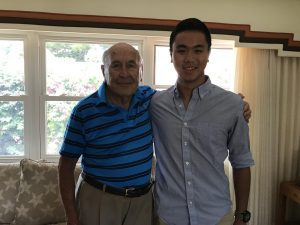Story #11 Gary Silvers
Story #11
Holocaust Survivor: Gary Silvers
Location: St. Petersburg, FL
In honor of the 25th Anniversary of The Florida Holocaust Museum (The FHM), this oral history series shares the stories of twenty-five Holocaust Survivors. Each Survivor brings to the series an individual voice that enlivens our understanding of the Holocaust; the war’s effects on individuals, families, and communities dispersed across the world; and its reverberations into the present moment.
One of the lesser known facts about World War II is that Shanghai, China became a safe haven for approximately 20,000 European Jews, as one of the few places in the world that did not require an entry visa. Gary Silvers and his parents—his Jewish father and Catholic mother—were among this small contingent of refugees. Gary was eight years old at the time they fled Nazi Germany in 1938, bound for a distant and unknown land.
Gary was born in Berlin and recalls a normal family life in early childhood. He attended a Jewish school and, although from a middle-class family, he was a “spoiled rotten kid,” he told us. But when he tried to go to school on Thursday, November 10, 1938, things were different. “Stores were destroyed, sinks were in the street.” When he arrived at his school, it was closed.
When he returned home, his mother was ready to take him back to school, but his father refused. Gary only learned later that the previous night was what became known as Kristallnacht—‘Crystal Night,’ or the Night of the Broken Glass—and that his father had almost been arrested and sent to a concentration camp.
“The Crystal Night,” Gary explained, “is the night when the Nazis destroyed the Jewish property, they arrested [Jews]. And something else happened, which at that time I didn’t know. I was asleep at night. . . . From my mother’s side, the Christian side, one of my aunt’s husband was a Gestapo guy, with the black uniform, with the pistol. And a cousin was married to a German army officer. And that night they [the Gestapo officer and the army officer] were at my home. When the police came to pick up my father to take him to the concentration camp, the Gestapo guy said ‘Stop.’ And nobody argues with a Gestapo guy. They have much more power than the police. So they left. But the Gestapo guy told my father, ‘Get the hell out of Germany, as far as you can, because things are going to get bad, and I can’t do this again. It’d be my neck.’”
Gary asked us to picture the decision his family faced. “So anyway, we had to leave. Now just imagine yourself, you and your family have lived all your life here, you have a normal life, you have no problems, and you have to leave to somewhere.”
Occupied by Japan after 1937, Shanghai was one of the few places in the world that did not require an entry visa. “You could go there as long as you could get there. No reason required, nothing,” Gary explained.
While his other Jewish relatives decided to stay behind in Germany, Gary and his parents took a train to Bremerhaven, a port city in the northern part of Germany, where they had to pass through border control before leaving Germany. Emigrants were allowed to take a certain amount of money through customs. Gary recalled his exchange with a Nazi official at the customs checkpoint. “Mister, I don’t have nothing. When I go to birthday parties, the adults get two hotdogs, I get one. Life isn’t fair,” the young Gary told the officer, who laughed and said, “Get going, move,” letting Gary past the checkpoint.
What Gary did not know, and what he only learned much later in life, was that his parents had hollowed out the heel of his shoe to smuggle diamonds out of Germany.
The Silvers embarked on a four-week trip on a luxury liner around Europe and through the Mediterranean and the Suez Canal, eventually reaching Shanghai.
After a comfortable month aboard the ship, the family’s living situation changed radically upon arrival. “They transported us with a truck to an abandoned school, where four couples lived in a classroom where they had put up cots. No privacy, no nothing. And many people—not many people, I don’t know how many—who came to Shanghai committed suicide when they saw what they had to face up there,” Gary said.
Gary’s father was able to use the money they had smuggled out of Germany to rent a nearby house. Gary was able to attend a British school, and even go to summer camp. But he also contracted malaria and small pox, and only by selling his mother’s sewing machine was the family able to afford the medications needed to treat him.
After the bombing of Pearl Harbor, American and other aid to Shanghai Jews was cut off, while Nazi Germany exerted increasing pressure on Japan to devise a plan to annihilate Jews under its jurisdiction. Japan did not agree to these terms, but instead put the Jews living in Shanghai in a single district of the city, the Restricted Sector for Stateless Refugees, also known as the Shanghai Ghetto. As a strategic move, Gary informed us, the Japanese surrounded this district with ammunition stores, because “the Americans will never bomb where Europeans are.”
To make ends meet, Gary’s mother sold sausages, which Gary would steal when he could. “My mother slept with the bread in bed, because if I would have gotten hold of it, I would have eaten it, I was so damn hungry.” They also tried to raise chickens, but they were stolen almost immediately. Although the Silvers were foreigners, the Chinese showed no overt hostility. “The Chinese community is like any other community. They were worried about where they would get their meals and so forth. I had no bad experiences with either the Chinese or the Japanese people,” Gary said. They even lived next to a Japanese Naval Officer.
When the atomic bombs were dropped on Japan and the war ended, the Silvers knew they had to leave Shanghai. Although they initially sought to immigrate to Australia, they were instead able to board an American transport ship, the General Gordon. They landed in San Francisco, and then settled in Indianapolis. Gary went on to study at Indiana University, Washington University, and Georgetown Law School. “I knew right then and there that the key to my future was education, education, education,” Gary recalled.
 (Gary sharing his story and experiences during the Holocaust Remembrance “Confronting the Holocaust: American Responses” at MacDill Air Force Base in 2014. -U.S. Air Force photo by Airman 1st Class Vernon L. Fowler Jr./Released)
(Gary sharing his story and experiences during the Holocaust Remembrance “Confronting the Holocaust: American Responses” at MacDill Air Force Base in 2014. -U.S. Air Force photo by Airman 1st Class Vernon L. Fowler Jr./Released)He now lives in Largo, Florida with his wife and two dogs, and has three children. He has shared his story frequently at The Florida Holocaust Museum as well as other venues, including MacDill Air Force Base, high schools, and nursing homes. “My main message,” he told us, “is that it happened, and if it happens again, do something.”
He also believes deeply in education, and on the occasion of the 25th anniversary of The Florida Holocaust Museum, he supports its mission. “I think The Florida Holocaust Museum is doing a good job because it attracts the children and so forth. And we can tell them about our experience.”
 (Gary and Eckerd College student Sam Seader in 2018)
(Gary and Eckerd College student Sam Seader in 2018)Story by: Sam Seader, Keeli Armitage, and Megan Weiss
Edited by: Jared Stark and Kristen Wright
